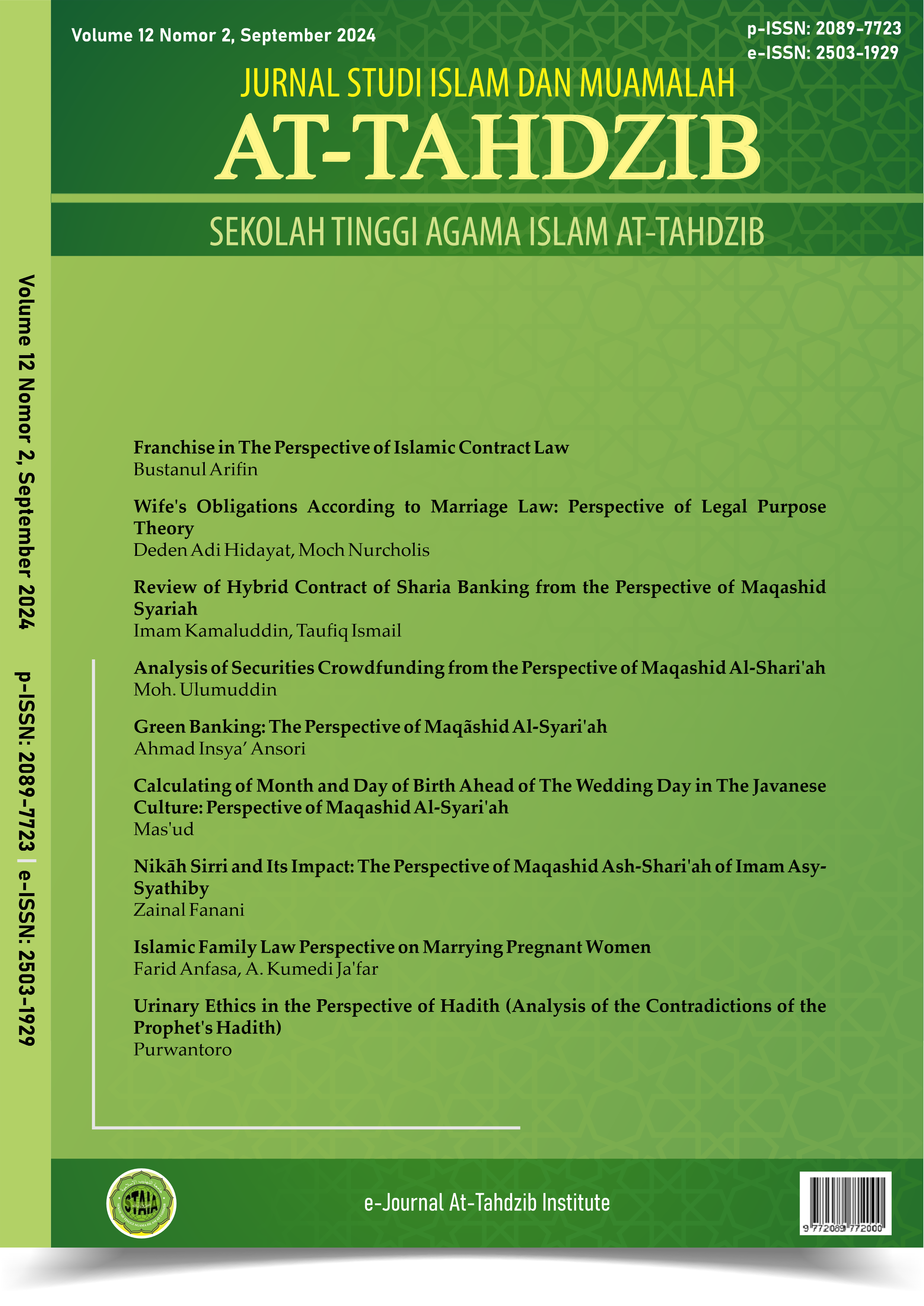Wife’s Obligations According to Marriage Law: Perspective of Legal Purpose Theory
DOI:
https://doi.org/10.61181/at-tahdzib.v12i2.395Keywords:
Marriage law, wife’s obligations, theory of legal purposeAbstract
Background. The wife’s obligations under marriage law are contrary to Islamic law.. This difference raises questions about the suitability of the law with social values. Social history records significant developments in the role of the wife in the dynamics of household affairs.
Aims. To analyze the basis of Article 34 paragraph 2 of the Marriage Law concerning the wife's obligation to manage household affairs and theoretical views on the purpose of the law on the article.
Methods. Normative legal research uses a conceptual approach to explore the understanding of the basis of law. Data were obtained through literature studies and analyzed descriptively based on the theory of the purpose of law.
Results. Article 34 paragraph 2 iin terms of justice, reflects distributive and commutative justice. The fair division of roles between husband and wife is reflected and affirms equality in lineage and family identity. Justice will be achieved by avoiding exploitation or inequality in the exchange of roles. The wife's obligations in terms of benefits are considered an effort to achieve the greatest possible benefits for individuals and families. Consistent and clear application of the law is very important in terms of certainty. The history of marriage law shows the complexity in the interpretation and application of the law. Efforts to create legal certainty have been made through the unification and simplification of laws, as well as the affirmation of norms that regulate the wife's obligations firmly and unambiguously.
References
Agustin, Riska Dwi. “Ham, Cadar Dan Narasi Pluralisme Di Indonesia.” Jurnal Kajian Islam Interdisipliner 3, no. 1 (2018): 43. http://ejournal.uin-suka.ac.id/pasca/jkii/article/view/1211.
Apong Herlina, Dkk. “Laporan Hasil Penelitian “The Study of Gender and Access to Justice in Indonesia”,” 1991.
Az-Zuhaili, Wahbah. Fiqh Al-Islami Wa Adillatuhu. Cetakan Ke. Damaskus: Darul Al-Fikr, 1975.
Badriah. “Hak Dan Kewajiban Suami Istri Perspektif Hukum Islam (Studi Kasus Wanita Karir Di Desa Benda Kec. Sirampog Kab. Brebes)” 3, no. 1 (2023): 73–89.
Batubara, Lidya Tiara. “Analisis Terhadap Peran Isteri Menyelenggarakan Pekerjaan Rumah Tangga Dalam Khi Pasal 83 Ayat 2 Skripsi,” 2021.
David, Dave. “Keberadaan Surat Ijo Dikaji Berdasarkan Pendekatan Kasus Dan Teori Tujuan Hukum Gustav Radbruch.” Jurnal Education and Development 9, no. 4 (2021): 478–84.
Iqbal, Firdaus Muhamad. “Kontribusi Sistem Civil Law (Eropa Kontinental) Terhadap Perkembangan Sistem Hukum Di Indonesia.” Jurnal Dialektika Hukum 4, no. 2 (2022): 180–200. https://doi.org/10.36859/jdh.v4i2.1120.
Julyano, Mario, and Aditya Yuli Sulistyawan. “Pemahaman Terhadap Asas Kepastian Hukum Melalui Konstruksi Penalaran Positivisme Hukum.” Crepido 1, no. 1 (2019): 13–22. https://doi.org/10.14710/crepido.1.1.13-22.
Kautsar, Izzy Al, and Danang Wahyu Muhammad. “Urgensi Pembaharuan Asas-Asas Hukum Pada Undang-Undang No 37 Tahun 2004 Berdasarkan Teori Keadilan Distributif.” Jurnal Panorama Hukum 5, no. 2 (2020): 182–92. https://doi.org/10.21067/jph.v5i2.4529.
Kementrian Sekretariat Negara RI. “Uu N0.16/2019.” Undang-Undang Republik Indonesia No 16 Tahun 2019 Tentang Perubahan Undang-Undang No 1 Tahun 1974 Tentang Perkawinan, no. 006265 (2019): 2–6. https://peraturan.bpk.go.id/Home/Details/122740/uu-no-16-tahun-2019.
Malik, H Rusdi. Memahami Undang-Undang Perkawinan. Jakarta: Universitas Trisakti, 2009.
Nawang Sari, Rahma Pramudya, and Anton. “Wanita Karier Perspektif Islam.” SANGAJI: Jurnal Pemikiran Syariah Dan Hukum 4, no. 1 (2020): 82–115. https://doi.org/10.52266/sangaji.v4i1.446.
Nur Aviva, Faradistia. “Pengaruh Teori Positivisme Hukum Dan Teori Utilitarianisme Hukum Dalam Penegakan Hukum Indonesia.” Jurnal Relasi Publik 1, no. 4 (2023): 111–23. https://doi.org/10.59581/jrp-widyakarya.v1i4.1837.
Putra, Abdur Rahman Adi Saputera. “Telaah Al-Siyasah Al-Ahkam Al-Usrah Terhadap UUP No. 1 Tahun 1974.” El-Ahli : Jurnal Hukum Keluarga Islam 1, no. 1 (2020): 103–22. https://doi.org/10.56874/el-ahli.v1i1.59.
Rahardjo, Satjipto. “Ilmu Hukum.” Bandung: Cipta Aditya Bhakti, 2021.
Rifqi, Muhammad Jazil. “Sejarah Sosial Talak Di Depan Pengadilan Agama Dalam Undang-Undang Perkawinan Di Indonesia.” Al-Hukama’ 11, no. 2 (2021): 55–84. https://doi.org/10.15642/alhukama.2021.11.2.55-84.
Sadam Asir, dkk | 5285. “KONSEP PEMBATALAN NORMA HUKUM (Studi Perbandingan Konsep Asas Lex Posteriori Derogat Legi Periori Dan Konsep Nasikh Mansukh) Sadam.” Dinamika 28, no. 15 (2022): 5285–5300. https://jim.unisma.ac.id/index.php/jdh/article/view/16482.
Santika, Sovia, and Yusnita Eva. “Kewarisan Dalam Sistem Kekerabatan Matrilineal, Patrilineal Dan Bilateral.” Al-Mashlahah : Jurnal Hukum Islam Dan Pranata Sosial Islam 11 (2023): 193–203. https://doi.org/10.30868/am.v11i02.4874.
Setiawan, Otto Trengginas. “Reformulasi Sistem Perencanaan Pembangunan Nasional Dengan Model Gbhn Sebagai Haluan Negara.” PARAPOLITIKA: Journal of Politics and Democracy Studies 2, no. 2 (2021): 20–50. https://doi.org/10.33822/jpds.v2i2.5902.
Sujati, Budi, and Ilfa Harfiatul Haq. “Gerakan Perempuan Di Jawa (1912-1941).” Ishlah: Jurnal Ilmu Ushuluddin, Adab Dan Dakwah 2, no. 1 (2020): 16–31. https://doi.org/10.32939/ishlah.v2i1.10.
Suprayogi, Rizqi. “Reformasi Hukum Perkawinan Islam Di Indonesia.” Indonesia Journal of Business Law 2, no. 1 (2023): 29–37. https://doi.org/10.47709/ijbl.v2i1.1962.
Wicaksana, Muhammad Hadyan, and Maulana Mohammad Makhtum. “Pemikiran Ibrahim Hosen Mengenai Dasar Wajib Patuh Terhadap Undang-Undang Perkawinan (UUP).” As-Salam: Jurnal Studi Hukum Islam & Pendidikan 10, no. 2 (2021): 79–93. http://ejournal.staidarussalamlampung.ac.id/index.php/assalam/article/view/471.
Wiranata, Nopan, Ismail Ismail, and Alimni Alimni. “Tinjauan Hukum Perkawinan Islam Berdasarkan Sejarah Pembentukannya.” El-Usrah 5, no. 2 (2022): 318–27. https://doi.org/10.22373/ujhk.v5i2.15623.
Downloads
Published
Issue
Section
License
Copyright (c) 2024 Deden Adi Hidayat, Moch Nurcholis

This work is licensed under a Creative Commons Attribution 4.0 International License.




